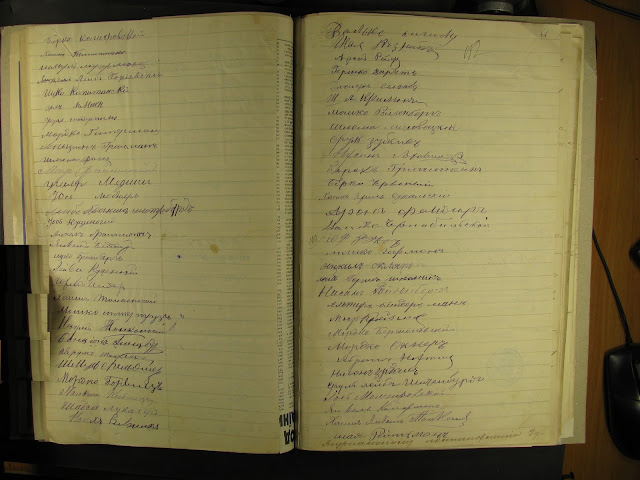In 1892, the Jews of Gaysin district, Podolia Guberniya, Russian Empire (now Ukraine) were negotiating rates with the local Crown/Treasury Rabbi. This was not necessarily the Rabbi in the shul (synagogue) that they went to, but this person was an intermediary between the Russian government and the Jewish community. They were responsible for registration of Jewish vital events and various other things. (You can read more about their responsibilities here.) I'd love to know the backstory to this particular document, but in 1892, there was an agreement made between the Jewish heads of household of Gaysin district and the Rabbi where rates were laid out--as well as the repercussions if this Rabbi ever protested those rates. And then as a bonus, all (or most?) of the Jewish heads of household in the district signed the agreement, including at least three relatives of mine!
 |
| 1892 Agreement of the Gaisin Jewish Society with the Treasury Rabbi on the cost of his services (from DAViO 286-1-192) |
Rates that this Rabbi could charge differed depending on the type of record being recorded and sometimes within a category of record (deaths of those under 18 cost less to register than those over 18).
In 1892 December 22 days we have signed the Gaysin merchant and bourgeois Jewish societies below and have run for the office of the Treasury Rabbi in the Gaysin area in the following:
1. We, the Jewish community, by mutual agreement, have agreed with the State Rabbi, who has to be elected and approved by the Treasury in the Gaysin district, to reward him for performing various religious rituals, issuing birth certificates and various certificates from birth books as follows, namely: for each certificate on twenty kopecks., for the issuance of various kinds of metric records for one ruble, for recording acts in the birth registers of both sexes, born at thirty kopecks., marriage of both spouses two rubles., divorce at two rubles., deceased before the age of 18 for twenty-five kopecks., for the older age, fifty kopecks. and
2. If I, the subscribing person below, will be elected by the named society and by my superiors approved to the position of the Treasury Rabbi in the named area, from this I undertake to receive my remuneration in accordance with the above established rate and have no right to demand it above the prices established by the society, otherwise I am subject to legal liability.
I'm interesting in knowing what sort of legal liability this Treasury Rabbi could have been liable for--whether via the Jewish or Russian Empire court system. But unfortunately that isn't listed here.
There are then four full pages with signatures of townspeople. One of those people, Mordechai Zubkis (my first cousin five times removed), lived in nearby Kuna, in Gaysin district. Two of his sons--Itzko and Srul--also signed this document. Mordechai's death in 1899 was recorded in Gaysin as having occurred in Kuna--and it would have cost his family 50 kopecks, given his over-18 age.
 |
| 1892 Agreement of the Gaisin Jewish Society with the Treasury Rabbi on the cost of his services (from DAViO 286-1-192) - some signatures |
The signatories here were indexed by Павел К-кий on j-roots, and you can see the index here. This is the kind of record that genealogist don't tend to gravitate to (they tend to think of vital records and censuses). But these records not only place people at a particular place in a particular point in time, they also help you to understand the atmospherics in which those people lived. So don't discount these sorts of records--and if you have Russian Empire ancestry, I'm going to stress the importance of dealing with j-roots (despite its being in Russian) yet again!
I'd like to see how likely it is for any modern-day Jewish community to have such complete agreement over any societal issue like the Jews of Gaysin district had!
You can like my page on Facebook:
or follow @larasgenealogy on Twitter.

About two Rubles to the Dollar then. (Back when an ounce of gold was $20.)
ReplyDeleteAmazing documents and information
ReplyDelete